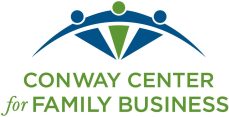Speed or Trust? By Jennifer Griffith
Jennifer is the Ohio Regional President of First Merchants Bank – a Service Provider member at the Conway Center for Family Business.
Amazon is considered a world leader in speed, although its mission statement is focused on building the earth’s most customer–centric company. Amazon offers one hour delivery because, in their customer–centric company, the customer asked for it.
Last summer, my friend Jennie Joseph used Amazon’s app to send ice cream, in a pinch, back to her office. Speed was important. Jennie and her husband, John, were boarding a plane for Naples when she though it would be fun to send a party gift back to their office. Their associates were hosting a Red, White & Boom party and were joyfully surprised when an ice cream delivery person showed up with 25 cartons of Haagen–Dazs! Amazon made the delivery inside of an hour, and Jennie tells me her firm is still talking about it! Fun and delicious!
A local retail furniture store, TROVE Warehouse, recently shared its passion for meeting their customers’ needs in innovative ways. For example, if a customer falls in love with a piece of furniture on the showroom floor, they are encouraged to take it home. No waiting six weeks for delivery. The store will re-set the showroom and replenish its inventory. If you’d like a custom piece, the designers are there to help. The speed of arrival for your newly-found treasure is your choice, not theirs.
Consider the following equation:
↑Trust = ↑Speed ↓Cost
If driving down costs is important to the results of your company, then it isn’t speed or trust. It’s speed AND trust!
Stephen M. R. Covey analyzed the economics of trust as a differentiator in his book, “The Speed of Trust.” He writes that trust is the hidden variable in the measurement of results. It is either a tax or a dividend. Increasing trust will increase speed and drive down costs. Increasing the speed of business requires trust to mitigate the risks that come with the speed.
The “Smart Trust” matrix plots a business leader’s propensity to trust against their need for analysis. We all know someone who has suffered paralysis by analysis and we understand how that slows down an organization. Likewise, when you unite good business judgment with good people judgment, you get “Smart Trust.” This is the sweet spot for driving down cost and elevating the speed of strategic initiatives while mitigating risks.
Per Covey, trust is the sum of character and competence, or people judgment and business judgment. Similar themes were explored by Jason Jennings & Charles Duhigg in separate business books. Jennings wrote about speed as a competency in, “It’s not the big that eat the small…it’s the fast that eat the slow,” and Duhigg wrote about character as a measure of productivity in “Smarter Faster Better.” Covey identified the powerful relationship that exists between both.
Double entry accounting reminds us that nothing happens without an offset. Speed is both a competitive advantage and introduces risk in many forms. If you’re driving your business through the intersect of “Smart Trust,” you should feel confident in the dividends it’ll pay!
Jennifer Griffith is the Ohio Regional President of First Merchants Bank – a Service Provider member at the Conway Center for Family Business. If you’re intrigued by speed or trust driving your business, please feel free to contact Jennifer directly at 614.583.2050 or by email at jgriffith@firstmerchants.com.

